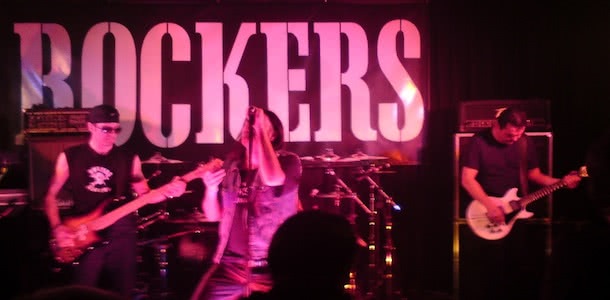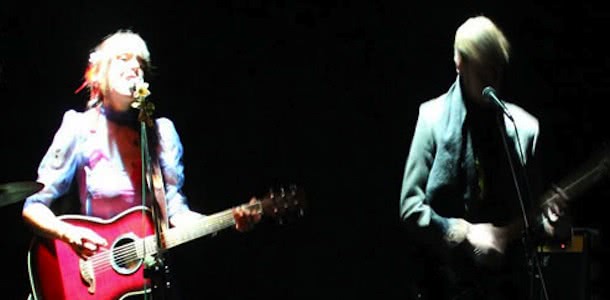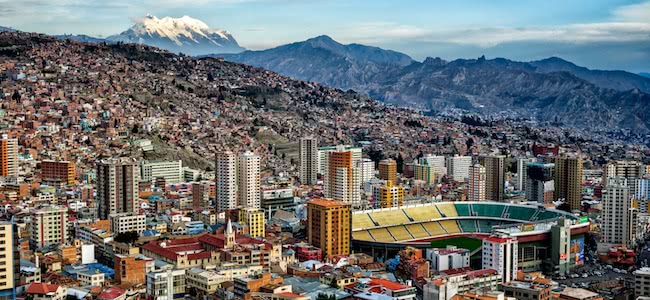Even though La Paz is the world’s highest de facto capital city – that’s some 3,500m above sea level – the city’s music scene is nowhere the heights achieved by its South American contemporaries in Santiago, Rio de Janeiro and Buenos Aires.
But that doesn’t mean you should strike a red line through Bolivia’s second largest city. Most will find themselves making their way to the metropolis either on their way to or from the spectacular Salar de Uyuni – that is the world’s largest salt flats.
So while you’re in one of the continents most unique cities you may as well let your ears soak in the music that La Paz has to offer.
J. Zamora and André De Oliveira are two faces behind the city’s emerging music scene. Both, along with a hardworking team, that comprises of the scene’s most talented individuals, makeup Random Is Not Whatever, one of the very few record labels in La Paz.
In an interview with Sounds and Colours they bemoan the city’s lack of music venues and groundbreaking acts while pointing the finger at cover bands and those that support them as the main reasons behind La Paz’s struggling music scene.
But the two forget to mention that they’re apart of a group of local artists who are working hard to fix all that. What they represent along with electronic labels Neurotrance and San Pedro Estudios and experimental label Entropia Records is a movement, which prides itself on quality original music.
Started in 2009 Random Is Not Whatever aims to get “the Bolivian audience involved with us therefore the community grows and we prepare a somewhat ‘solid’ ground for future musicians and artists alike”.
Love Music?
Get your daily dose of metal, rock, indie, pop, and everything else in between.
By providing a platform the aforementioned labels are beginning to inject some life into the legs of the local music scene so that eventually it can one day stand on its own.
But for foreigners their experience of the music culture in La Paz is likely to be limited to the peña tradition of folk music. Venues that offer both local cuisine and music (read about a few below) are big tourist drawcards in the city.
While they may not be entirely representative of todays music scene they do provide travellers with an insight into the history of Bolivian music.
However with La Paz’s music scene continuing to develop it’s only a matter of time before those outside the local bubble are exposed to the music makers of Bolivia.
Shop

Mercado Negro
Due to La Paz’s lack of music stores – regardless of the format – much of the music shopping to be done in the city is found in the markets. As flea markets go this is one of the biggest of its kind in the world. You’ll find plenty of CDs and DVDs here of varying quality. This area, which is vast and impossible to pinpoint given its location is situated across the city, is known for pickpocketing so remember to keep your wits about you.
The Witches’ Market, Mercado de Hechiceria or Mercado de las Brujas
It’s not exactly the first place you’d think you would find Bolivian musical instruments for sale, but even if you’re not shopping for a charango the contents of The Witches Market will leave an everlasting impression. You’ll also find llama foetuses, dried frogs and many other eccentric ornaments here.
Listen

Peña Huari, Sagárnaga 339 Belen
As its name suggests this establishment is well schooled in the peña tradition. So much so that it is the most popular of its kind. With a market base that is made up of tourists and local business workers it’s little surprise that it draws a hefty crowd. With the shows starting around 8pm each night make sure you get their a little earlier to ensure you get a table.
La Casa del Corregidor, Murillo 1040 Belen
With a gorgeous colonial building to draw you in this venue offers a more expensive peña experience. With typical Bolivian food such as llama steak and trout from Lake Titicaca the local musicians that play there will provide you with a cultural experience that you won’t soon forget.
Teatro Municipal Alberto Saavedra Pérez, Indaburo cnr Sanjinés
Fans of traditional folk or tourists keen on sampling the music that has defined Bolivian music for decades should consider stopping by this venue which offers everything from folklore shows, folk music gigs and foreign theatrical presentations. If not for the music than the architecture of the restored building is there to appreciate. The interior comprises of a round auditorium with detailed balconies and an incredible ceiling mural.
See

Museo de Instrumentos Musicales, Jaén 711
Founded by local musician Ernesto Cavour this museum is home to the largest collection of musical instruments in Bolivia. It’s one of the most important establishments for the local music scene with the instruments on offer preserving history for new generations to come. The seven rooms encompass a wide range of instruments that are practiced throughout various areas in the country. There is also a section where children can play ancient instruments in the museum that aren’t just your typical wooden tools, but also things such as bones, turtle shells and toucan beaks.
La Paz Acts You Should Check Out

¿Traes Flashh?? – Soundcloud
A lack of originality is often cited as one of the main drawbacks of those who practice the acoustic singer-songwriter genre, but there is one thing that keeps this style of music relevant. Spacious and simple chords along with a resonating voice have the power to leave a lasting emotional impression and ¿Traes Flashh?? does just that.
Digital Revolver – Soundcloud
Heavy electronic textures with a psychedelic bent are at the core of the sound of DJ Lattus and Deep South. Considered as two of the country’s biggest music innovators this project from the duo adds a new chapter to the experimental music being made in Bolivia.
Hala de Mosca – Soundcloud
The legends of rock have heavily influenced this four-piece who define their sound as “new classical rock and roll”. The track below, ‘Run Away’, affirms as much. Hala de Mosca are gritty and raw rock and roll that is as energetic as the artists that have paved the way for this band.

































